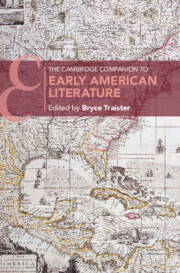Book contents
- The Cambridge Companion to Early American Literature
- The Cambridge Companion to Early American Literature
- Copyright page
- Contents
- Figures
- Contributors
- Introduction
- Part I How to Read (in) Early America
- Part II Readings in Early America
- Part III Early American Places
- 12 Indigenous Colonial America
- 13 Colonial Latin America
- 14 The Colonial Pacific
- 15 Caribbean America
- Select Bibliography
- Index
- Cambridge Companions To …
13 - Colonial Latin America
from Part III - Early American Places
Published online by Cambridge University Press: 18 November 2021
- The Cambridge Companion to Early American Literature
- The Cambridge Companion to Early American Literature
- Copyright page
- Contents
- Figures
- Contributors
- Introduction
- Part I How to Read (in) Early America
- Part II Readings in Early America
- Part III Early American Places
- 12 Indigenous Colonial America
- 13 Colonial Latin America
- 14 The Colonial Pacific
- 15 Caribbean America
- Select Bibliography
- Index
- Cambridge Companions To …
Summary
Over the past twenty years, experts on early North America have increasingly turned to comparative and connected modes of study to explain the effects of colonialism on social, political, and aesthetic developments throughout the so-called New World, where English and Spanish empires appropriated and carved up the largest sections of Indigenous territories. Despite notable linguistic, religious, and chronological differences in Anglo and Iberian colonialisms, this critical hemispheric turn recognizes the interconnected nature of lived experience and writing in the region. As part of this volume’s reflection on the history and future of methods in early American studies, this chapter analyzes four major comparative paradigms in the study of the colonial Americas: generic, genetic, appositional, and mediative approaches. As I discuss each of these approaches, I provide examples from primary sources and critical studies published in the past ten years, outlining current modes of scholarship and future directions in the field.
Keywords
- Type
- Chapter
- Information
- The Cambridge Companion to Early American Literature , pp. 218 - 232Publisher: Cambridge University PressPrint publication year: 2021

